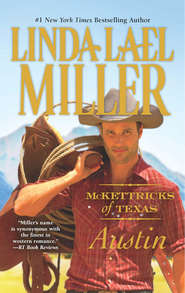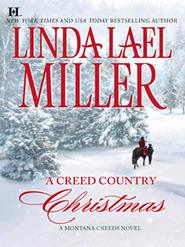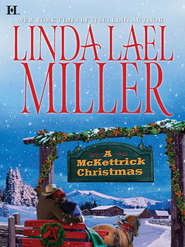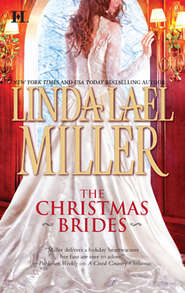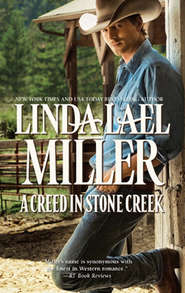По всем вопросам обращайтесь на: info@litportal.ru
(©) 2003-2025.
✖
McKettrick's Pride
Автор
Год написания книги
2019
Настройки чтения
Размер шрифта
Высота строк
Поля
“Well, you do resemble him, too,” Echo told her, exchanging glances with Cora.
“Did your furniture ever come?” Rianna asked.
Echo nodded. “Yesterday,” she said. “Avalon likes the air bed, so she slept on that.”
“You still don’t have any books,” Maeve remarked, approaching the display window. Avalon followed, licked the child’s hand tentatively.
“Next week,” Echo told her. “In the meantime, I’ve got a handyman coming to put up new shelves.”
“You girls come on inside now and don’t bother Miss Wells,” Cora said, sounding distracted. It was only eight-thirty, but the Curl and Twirl was already full.
Obediently, Rianna and Maeve went into their grandmother’s shop.
Cora lingered, looking a little flustered. “I didn’t mean to sound abrupt,” she said. “It’s just that, well, days like this, I miss Julie—that’s my daughter—even more than usual.”
Echo nodded. “Birthdays and holidays are harder,” she said quietly.
Cora brightened, making a visible effort. “It helps to keep busy,” she said. She gave an anxious little laugh. “Tell me I remembered to invite you to the party tonight,” she pleaded. “It’s on the ranch, at Travis and Sierra’s place.” Cora had already explained, during other sidewalk visits, that Sierra was Rance’s cousin and Travis was her husband. Travis had grown up with Rance, Jesse and Keegan, but Sierra was a relative newcomer to the family.
“You did,” Echo said. “And I told you I thought I’d be intruding.”
“Nonsense,” Cora said. “How else are you going to get to know people if you don’t come to parties? You can bring the dog, too, if you don’t mind letting her ride in the back of my truck. You could squeeze in up front with the girls and me.”
“I guess I could follow in my car,” Echo said. Cora was right. She was opening a business in Indian Rock, and she would have to get over her shyness and be a part of the community if she wanted this new chapter of her life to be a successful one.
Cora gave an approving nod. “We’ll leave here around six o’clock,” she said. Then she opened the door of the Curl and Twirl and vanished inside.
Echo ran damp palms down the thighs of her jeans. Rance wouldn’t be at the party, she reminded herself, and there was no reason to believe the rest of the McKettrick tribe wasn’t nice. Rianna and Maeve were sweet, and Cora was proving to be a good friend.
“We can do this,” she said.
Avalon cocked her head to one side, perked up her ears and let her tongue loll, looking just like the digital picture Echo had taken the day before and posted to every lost-pet Web site she could find.
All of a sudden, Echo wanted to break down and cry, right there on the sidewalk. Because little girls lost their mothers. Because their fathers were too busy to attend birthday parties. Because maybe no one cared enough about this dog to search the Internet and then come to take her home, and because someone might do just exactly that.
CHAPTER THREE
WHEN AVALON STAUNCHLY refused to get into the Volkswagen that evening at six sharp, Echo led the way back into the shop and up the stairs to her apartment on the second floor. Cora and the girls, about to drive off in Cora’s pickup truck, trailed after them.
With a sigh, Avalon settled onto the air mattress she’d appropriated after the furniture arrived, scorning Echo’s brass bed, an estate-sale find she prized very highly.
“Do you think she’s sick?” Echo asked worriedly, turning to Cora.
Cora smiled, approached the dog and crouched, gently patting the dog’s belly. “No,” she answered. “I think she’s pregnant.”
“You mean she’s going to have puppies?” Rianna cried exuberantly, before Echo could present the same question—not so exuberantly.
“What else would she have, dingbat?” Maeve asked her sister.
“Puppies?” Echo repeated.
Cora straightened, smiling. She looked festive in her red jeans, matching boots and silk shirt, causing Echo to wonder, even in the midst of rising panic, if her soft blue broomstick skirt-sweater combo and open-toed sandals were the proper attire for a party on a ranch.
“I’m no veterinarian,” Cora replied, “but I’ll stand by my diagnosis just the same.”
“Yikes,” Echo said.
Cora bent and gave Avalon a long, affectionate stroke with one hand. “You just rest, girl,” she told the animal. “I promise we won’t keep your mistress out late.”
“Shouldn’t I take her to an emergency clinic or something?” Echo fretted.
Cora chuckled. “No,” she said. “She’s not in any apparent distress. Just a case of the oogies, I figure.” She smiled fondly down at Avalon. “Right, girl?”
Avalon sighed, rested her muzzle on her forepaws and closed her eyes.
Meanwhile, Cora linked arms with Echo. “Come along, now,” she urged. “You’re all dressed up and you’ve got someplace to go. Avalon will be just fine.”
“Puppies,” Echo reiterated, but she let herself be pulled out of the apartment and down the stairs, casting anxious glances backward every few steps.
“That’s life for you,” Cora said, out on the sidewalk again, watching as Echo fumbled to lock up the shop. “Do you want to ride with us?”
“I’ll take my own car,” Echo decided. Cora’s truck would be crowded with her stuffed in there. Besides, she’d probably want to leave early. “I’ll follow you.”
Cora nodded, ushered the girls into the pickup and climbed aboard herself.
Echo, offering a silent prayer that Avalon would be okay in her absence, pulled out behind Cora and followed her the length of Main Street, then onto a series of country roads. After about fifteen minutes of travel, they passed beneath a huge, old-fashioned sign marking the entrance to the Triple M Ranch.
Echo knew little about the spread, just the basic facts she’d been able to scrounge up on the Internet, but passing under that arched wooden sign felt like slipping through a wrinkle in time.
The Triple M was the fourth largest ranch in the United States, and it had been founded by one Angus McKettrick, in the nineteenth century. Once primarily a cattle operation, the place was now dedicated to historical preservation. The family fortune, apparently considerable, was generated by McKettrickCo, an international corporation. Four houses remained from Wild West days, including the main ranch house, which Angus had built with his own hands, along with the original barns and other outbuildings.
Barreling along in a cloud of dust from Cora’s pickup, Echo simultaneously worried about her dog and wondered what it would be like to be part of something as vast as the Triple M. According to her brief research, McKettricks had been living on this land for well in excess of a century. Echo, who had never lived in one place for more than a few years, could barely imagine having roots in a piece of ground that had seen so many generations come and go.
Presently, after many twists and turns, one of the ranch houses came into sight, a huge, sturdy wooden structure as at home on the land as a venerable oak or ancient ponderosa pine.
Children and dogs chased one another noisily across an expansive front yard, and colored lanterns hung from virtually every tree limb in sight, glowing red and yellow and blue, even though it was still daylight.
There were cars and trucks slant-parked at every possible angle.
Feeling self-conscious amid such practical, well-used vehicles, Echo found a place to tuck her pink bug, gathered her forces and got out. She reached behind the seat for the large stuffed pony she’d bought at the drugstore in town, as a birthday gift for Rianna.
While the girls ran ahead to join the festivities, Cora wended her way from her own distant parking spot to walk with Echo. From the other woman’s expression, Echo gathered she’d half expected Indian Rock’s newest arrival to bolt for town without saying howdy to anybody.
Since she’d been tempted to do exactly that, Echo blushed slightly and bit her lower lip.
“They’re all good people,” Cora assured her. Evidently, mind reading numbered among her other skills, like fixing hair and teaching little girls to twirl batons. “If that pony’s for Rianna, you picked a real winner. She’ll love it.”
Echo straightened the big red bow tied around the toy’s middle. She’d done that herself, in lieu of wrapping paper. “I’m never going to remember everyone’s name,” she confided. Despite the public nature of her job at the museum in Chicago, and the similar ones that had preceded it, she was naturally something of a loner.






